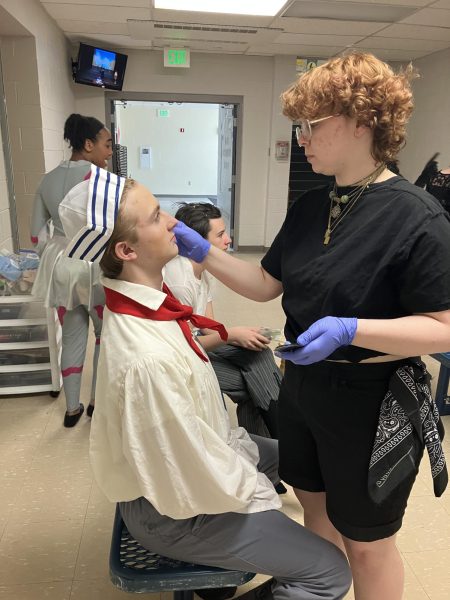Tied to Tech
February 1, 2018
Most kids in high school use Social Media, and use it a lot; in fact, major board members of Apple just said they wanted a plan to control excessive phone use by minors. In China, Internet Addiction is classified as a mental illness. To some of you, this invokes images of your parents, trying to coax you away from your friends and into doing whatever it is they have in mind. However, when you look at the facts, it is quite clear that excessive use of Social Media is most likely correlated to mental illnesses such as social anxiety and chronic depression, as well as sleep deprivation.
Even with all these negative factors, teens still constantly return to their phones, unwilling to delete apps like Instagram and Snapchat, even though it would be to our benefit. Why? The answer is simple: we’re addicted.
Through a potent combination of Coding and Psychology, Social Media companies have developed methods to hook kids on their product. An obvious example being Social Media company Snap’s “SnapStreak” feature on the Snapchat app. Many of you know how it works, but for those who don’t, after 3 consecutive days of communication, a “SnapStreak” begins.
Some people put a lot of effort into these SnapStreaks, with may teenagers seeing it as a badge of pride, symbol of friendship, or even as a claim to popularity. You see, this feature isn’t here just for laughs, it is a Human “Exploit” or Social Engineering, the art of “hacking” a person’s mind. You see, the more time you spend on Snapchat, the more money Snap makes.
So, as a ploy to make more money, Software engineers have made the app addicting through SnapStreaks, which use your competitive and need for acceptance, basic psychological concepts, against you. Even though the extensive use of Social Media harms their clients (overwhelmingly Millennials and Gen Z), Snap refuses to remove the feature from their system, and it doesn’t look like it will in the near future.
Another way tech companies addict you is the simple tool of notifications. Though notifications are quite useful, they also utilize the same hormone in the brain that causes gambling addiction. When somebody goes to check their phone notifications, it is much like using a slot machine. The curiosity caused by not knowing drives the user to keep coming back. When somebody sees a notification that isn’t spam, they are likely to click on it to ‘claim the reward’, or more accurately, satisfy natural instinct.
Even though it isn’t directly linked to any negative health issues, it does keep drawing us back to apps such as the aforementioned Snapchat, which have their own addiction causing systems. It is tech companies gambling on our desire to gamble to bring them more revenue.
Now some of you may be wondering, “Even if it is addicting me, how is that a bad thing? After all, social media makes me happy.” Well, methamphetamine also causes temporary happiness, but its side affects are devastating and cause lots of damage to the human body.
Since 2012, the year in which smartphones were owned by 73% of teens in the U.S., teen depression and suicide rates skyrocketed, and cell phone use hasn’t been going down. Over five hours of phone use a day has been reported by the Washington Post to increase the risk of having a suicide factor by 71%. Comparatively, those who didn’t use Social Media platforms reported feeling less depressed by the end of the week. Extensive use of phones may also contribute to sleep deprivation* which affects memory retention, focus, and mood. With all of these factors in mind, maybe you should consider deleting some of your apps.
“But what if I miss out on what my friends are doing?” This is perhaps the most insidious part of device addiction, our minds have been trained to not only constantly use apps, but retain them because they have tricked us into thinking that they are necessary.
Many people, even after they hear the health risks of social media use, are unwilling to give it up because they think they are missing out on something. Though asking a person about something face-to-face about something will yield the same result as reading it on Snapchat. In fact, much like a drug, it lingers in the mind for a period of time until the mind has been detoxed, afterwards, it has been reported to be less attractive and ‘needed’. If you’ve been eating healthier to lose weight or stay fit, maybe it would be good idea to help your brain and try a life without Social Media.
















